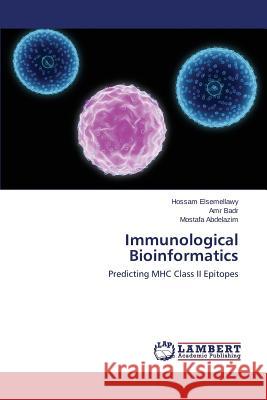Immunological Bioinformatics » książka
Immunological Bioinformatics
ISBN-13: 9783659792489 / Angielski / Miękka / 2015 / 104 str.
Successful Prediction for Major Histocompatibility Complex (MHC) molecule epitopes is an essential step in designing Genetic Vaccines. Successful prediction of MHC class II epitopes is more difficult than MHC class I epitopes due to open binding groove at both ends in class II molecules, this structure leads to variable length for MHC II epitopes and complicating the task for detecting the core binding 9-mer. In this Book we presented a novel classification algorithm for predicting MHC Class II epitopes using Multiple Instance Learning technique. Separated Constructive Clustering Ensemble (SCCE) is our new version for Constructive Clustering Ensemble (CCE). SCCE integrated Genetic Algorithm, K medoid clustering, Ensemble learning and Support vector machine in an orchestration to predict the MHC II epitopes. SCCE is tested by four benchmark data sets and achieved average accuracy 85%. SCCE results exceed most of the current state of art regression methods. SCCE achieved these results using only binder and non-binder flags, without need for regression data.
Successful Prediction for Major Histocompatibility Complex (MHC) molecule epitopes is an essential step in designing Genetic Vaccines. Successful prediction of MHC class II epitopes is more difficult than MHC class I epitopes due to open binding groove at both ends in class II molecules, this structure leads to variable length for MHC II epitopes and complicating the task for detecting the core binding 9-mer. In this Book we presented a novel classification algorithm for predicting MHC Class II epitopes using Multiple Instance Learning technique. Separated Constructive Clustering Ensemble (SCCE) is our new version for Constructive Clustering Ensemble (CCE). SCCE integrated Genetic Algorithm, K medoid clustering, Ensemble learning and Support vector machine in an orchestration to predict the MHC II epitopes. SCCE is tested by four benchmark data sets and achieved average accuracy 85%. SCCE results exceed most of the current state of art regression methods. SCCE achieved these results using only binder and non-binder flags, without need for regression data.











